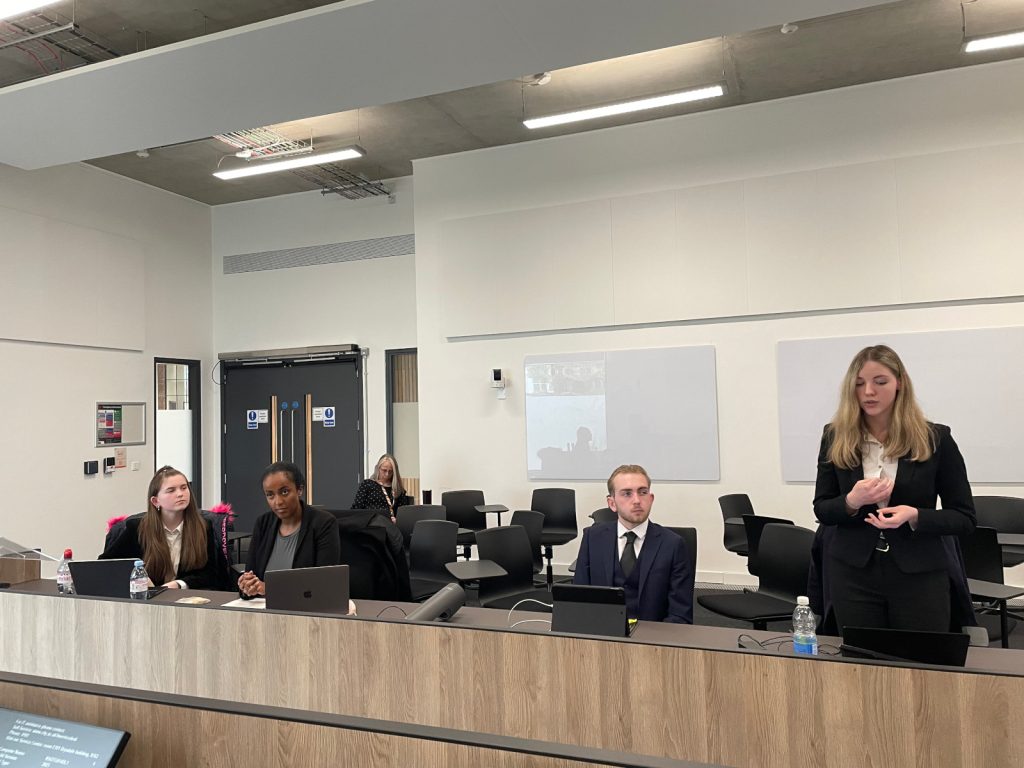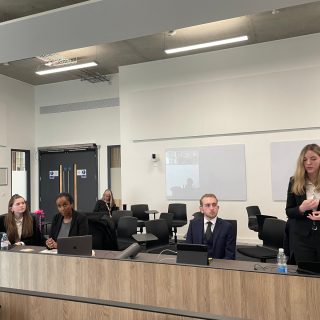If you’re wondering whether to give mooting a shot in your first year studying law, let Lucy Heap try to swing you round to the idea…
I came into my first year of law school as an eager student with a clear direction for my future. I wanted to be a Barrister. It is common knowledge that mooting is an essential activity for any aspiring Barrister’s CV. Therefore, when presented with the City Scholars Moot competition, I readily signed up alongside several friends.
A few weeks later, and confronted with my first moot problem, I feared I had made a mistake. I realised quickly that I had no real idea of how to moot or structure a skeleton argument and bundle. In this time, my friends were my greatest support, we looked through what felt like hundreds of examples online, eventually settling on a template for a skeleton and bundle together. This ended up being the template we all used through all 3 rounds, including in front of a High Court Judge in the finals.

Having settled on a template, we got to work on the moot problem separately. The moot problems for 2023/24 included criminal negligence, promissory estoppel and administrative law. Since I was only in my first year, much of the law required to understand these problems had yet to be taught to me. However, this issue was readily resolved by emailing the relevant professor and getting the lecture slides a week or two early. This small setback supplied me with an opportunity to be proactive in my learning as well as a great example to bring up in interviews of a time when I overcame a challenge.
On the day of my first moot, I was incredibly nervous. In my mind, there was so much that could go wrong and very little that could go right. I found that the easiest way to manage this anxiety was to pretend that I was completely confident in my argument (even though I was not) and to present it as if it was the most thoroughly thought out, groundbreaking proposition in the field (which it certainly wasn’t). In the end, my fear turned out to be baseless. The judge, a bar student at City, was kind and gave helpful feedback and directed praise, which went on to greatly aid me in future rounds.
I was aware that at any point in my argument, the judge might stop me to ask a question. These are called judicial interventions and test a mooter’s knowledge of the material and argument. In my experience, if you properly understand your argument and the law contained within it, you can answer any question that is thrown your way. I was asked a total of 8 questions across the 3 rounds and was only unable to answer 1. This was solely due to the fact I had brushed over a part of the law in my preparation, an error I was careful not to repeat again. Even though I was unable to answer, the judge did not shout or press me further. This came as a surprise to me at the time, but in the final, High Court Judge Rostant explained it well. He told us that judges are not there to catch you out, but to understand your argument in its entirety to ensure they make an equitable decision.
I was fortunate that my hard work manifested in a place in the final for me and two of my friends. We were given an Administrative Law problem and told to present it in front of a High Court Judge. Oftentimes in mooting, the facts and law heavily support one side over the other. This was the case with the ground I was given to argue, which in real life would be near unwinnable. However, due to the weight given to the presentation of the argument over the content of it I still managed to persevere through and win the whole competition, beating out those in the third year of their LLB.

My friends and I made plans to sign up for the international and national mooting teams for the next academic year, and we were lucky enough to be asked to represent the University in the National First Year Moot. My biggest tip to those considering signing up for mooting is to sign up with friends and learn the ropes together. The first competition is by far the hardest to navigate but the skills you learn and the experiences you have are those that will stay with you for life.
City Scholars is the perfect opportunity for any student to try mooting, as it is low-stakes and friendly. Whether you want to pursue a career in the bar or not, mooting provides you with transferrable skills that add to your application and provide a strong example of your presentation and planning that are easy and interesting to talk about in interviews for any area. For this reason, I would definitely encourage others to get involved in any mooting opportunity that arises.
Lucy Heap is a second-year law student at City University. She is a budding barrister still finding the area in which she wishes to practice.

